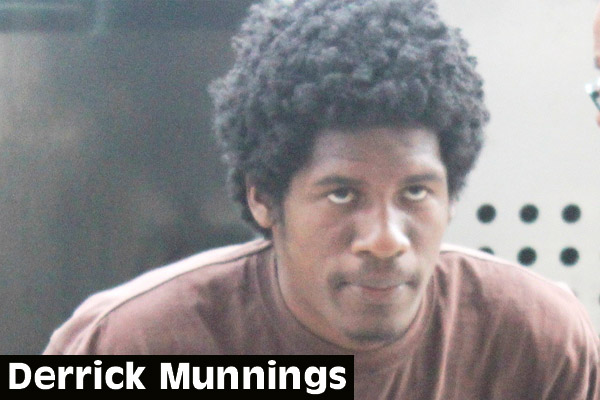A Ladyville man was freed today of an attempted murder charge indictment when the prosecution’s case against him collapsed after the victim failed to identify the accused as the person who stabbed him during a basketball game in April 2011.
The one-day trial without jury occurred before Supreme Court Justice John “Troadio” Gonzalez, who told the accused man, Derrick Munnings, 21, that he had no case to answer for the charge of attempted murder.
Munnings was on trial for the attempted murder of Donovan Pratt, who was stabbed once in the left area of his chest.
When Crown Counsel Leroy Banner, who prosecuted the case, called Pratt to the stand, his case began to go downhill, because Pratt introduced hearsay evidence that did not help the prosecution’s case and contributed to Munnings’ acquittal.
At the time of the incident in 2011, Pratt had reported to police that Munnings was the person who stabbed him on the basketball court, for no apparent reason. There was an altercation, but Pratt was not involved in it, and somehow he ended up being stabbed, he told police.
On the witness stand, Pratt told the court that he was stabbed by a man who was wearing a black T-shirt and a pair of red pants. The man who stabbed him was standing right in front of him, when he stabbed him, Pratt said.
He also told the court that his assailant is known by the street name “John” or “Jessie,” and that he was sure it was Derrick Munnings who was known by that name.
The conflicting part of Pratt’s testimony, however, was that he himself never knew that he was stabbed until his friends told him that he had been stabbed. He testified that he never really saw when the man who was standing in front of him stabbed him. He said he felt a sharp pain and then he was told that he was bleeding.
Justice Gonzalez asked him if he saw when the man who was standing in front of him stabbed him, and he replied no, because he was playing basketball and he was sweating.
In cross-examination, Munnings, who was unrepresented by an attorney, asked Pratt if he saw when he stabbed him.
Pratt replied no. He said that he was told by his friends that it was he (Munnings) who had stabbed him, yet he insisted he was sure it was Munnings who stabbed him, because he was standing in front of him.
Munnings also asked Pratt if he had picked him out of a police identification parade, but Pratt said he did not know whether the police had conducted an identification parade.
When he reported the incident to police, Pratt told them that he has known Munnings for eight years and that they live in Ladyville within one mile of each other.
In his defense, Munnings suggested to Pratt, under cross-examination, that he had made a mistake and was blaming the wrong man for a crime that he did not commit, because on the day in question, he was nowhere near the basketball court in that area.
On April 30, 2011, Derrick Munnings, who was still a minor, handed himself in to police in the presence of his mother when he heard he was wanted in connection with the stabbing.
He said he knew that he did nothing wrong, and that was why he surrendered himself to police.
By the time Pratt left the witness stand, he had still not identified Munnings as his attacker.
Following Pratt’s testimony, prosecutor Banner closed his case, conceding that he had not been able to prove all the elements of the offense of attempted murder.
Justice Gonzalez told Munnings that he had no case to answer, in light of the evidence that the prosecution had just presented, and that he was free to go.
Munnings, however, was not free to go home. He was taken back to the Belize Central Prison, where he is serving a 5-year sentence for a firearm conviction in 2012. He has three more years to serve.

